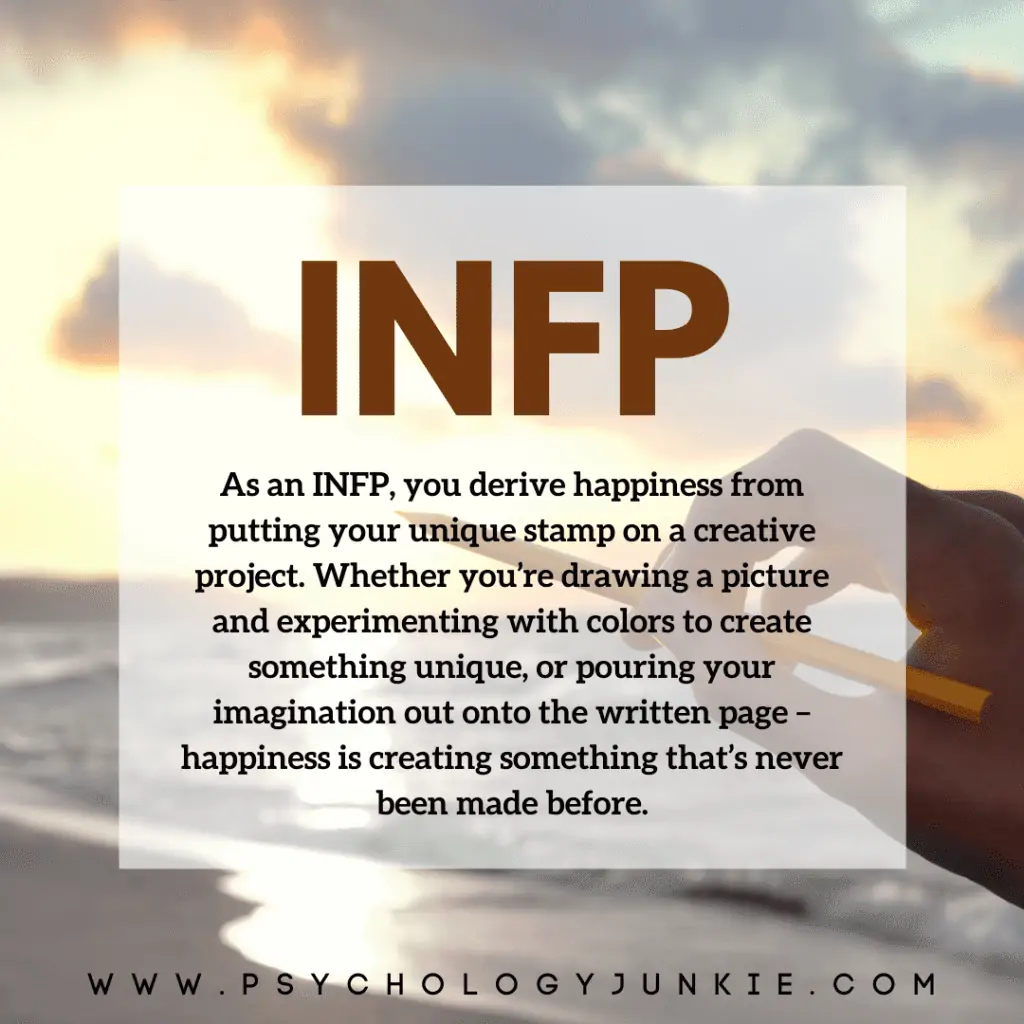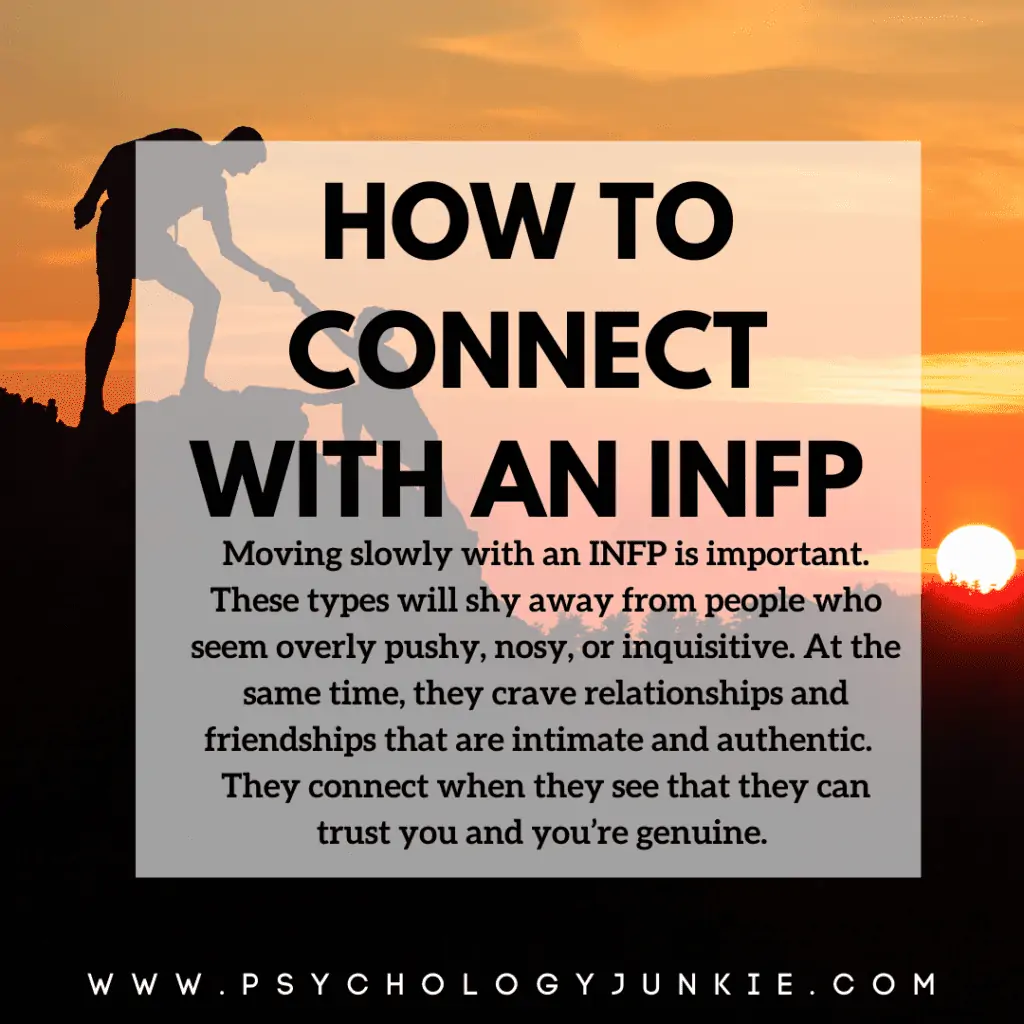How to Communicate Effectively with an INFP
Is there an INFP in your life that you’d like to talk to in an effective way? Whether you’re dating an INFP, parenting one, or working with one, communicating in a way that respects their personality is crucial. Many INFPs feel misunderstood or pressured to be something they’re not, so it’s important to be aware of their unique needs.
What Is an INFP?
The INFP is one of the 16 Myers-Briggs® personality types. Each of the four letters in their type code (INFP) means something.

I = Introversion. INFPs focus on their inner thoughts and feelings before responding to the outside world. They gain energy from alone time when they can reflect, ponder, and imagine.
N = iNtuition. INFPs prefer focusing on abstract possibilities and insights rather than concrete details. They prefer imagining what could be rather than fixating on what “is.”
F = Feeling. INFPs apply personal values to their decision-making. They want to live in congruence with their own highly personal set of ethics and they consider the emotional impact a decision will have on others.
P = Perceiving. INFPs like having a lot of options and tend to be flexible rather than structured. They like to mix work with play and enjoy an exploratory approach to life.
Not sure what your personality type is? Try out our most highly recommended personality questionnaires:
- You can take our free personality questionnaire here
- You can take Personality Hacker’s highly accurate personality questionnaire.
- You can take the official Myers-Briggs Type Indicator® for $49.95
This article contains an affiliate link to a questionnaire on Personality Hacker. If you purchase one of their courses, I get a small kickback that I can use to pay for hosting and other demands of this site. I only recommend courses I love.
The INFP Identity:
INFPs are one of four personality types with the Idealist temperament. Idealists have an NF in their type code and are composed of INFPs, INFJs, ENFPs, and ENFJs.
For the idealist, life is all about finding one’s true purpose and identity. More than gathering material wealth, most Idealists care about finding the meaning of life, their significance, and the truest understanding of who they are. You could say that self-actualization is the name of the game for idealists.
INFPs are gentle, compassionate people who care deeply about other people. They have rich inner worlds and are often creative individuals. In the background of their daily lives there is a deep yearning to be doing things that are purposeful, intentional, and meaningful. Living a life of authenticity and integrity drives them and many feel trapped and pressured by modern life with all its meaningless distractions and bureaucracy.
“Indeed, NFs report over and over that they are subject to an inner voice which urges them to “Be real, authentic, meaningful.” Always in the NF is that voice dialoguing about being whole, significant, and oneself.” – David Keirsey, Please Understand Me
It’s crucial for INFPs to feel that they are being honest about who they are. This honesty doesn’t mean that they are “brutally truthful,” however. Typically sensitive and gentle, INFPs want to avoid hurting others and will often give criticism in an empathetic and encouraging way. The honesty that I refer to for INFPs is more of an honesty of self. They want to feel that they are aligning their lives with their truest purpose and that they aren’t living a lie, doing things that don’t feel aligned with their identity, or being hypocritical.
INFPs, while gentle and conscientious, do not want to pretend for anyone. They care little for social norms in many cases and prefer to live life according to their own inner compass. They often feel as though they are “misfits” in the world and that the world doesn’t quite understand them. INFPs want to be understood for who they are and not be pressured or coerced into being someone they’re not.
The INFP Communication Style:
Because of the INFP’s Idealist nature, they tend to use imaginative and dramatic language. As intuitives they employ metaphor, symbolism, and abstract word use in their speech. Often avid readers, INFPs enjoy storytelling, but will only share their stories with a select few who have earned their trust.
The core drive of the INFP in communication is to be authentic, to support others, and to dwell on meaningful and imaginative territory. These types encourage participation and are often good listeners, looking to ascertain others’ values and get a glimpse of what they’re all about. Often they will search for commonalities (“you love fantasy novels? So do I?!”) or unique quirks that set people apart. At the same time they search out any sign of ill-intent, manipulation, or phoniness.
INFPs prefer to communicate one-on-one or in small groups. They may have a few close friends that they are incredibly loyal to and who know them deeply. INFPs can be difficult to get to know at first and may seem shy or aloof, but once you’ve earned their trust they will open up their inner world to you and let you in.
When it comes to conversation, INFPs generally avoid prolonged small talk and enjoy conversation that delves into deeper territory. They may have a hard time understanding why others would want to waste time discussing weather, sports, or other trivialities when there are more important things to discuss. INFPs want conversations that will inspire, teach them something new, or help them understand someone else better.
Signs You’re Communicating with an INFP:
- They get to the center of what’s important to individuals
- They are gentle and sensitive with their words
- They encourage participation
- They use metaphor and symbolic language
- It’s crucial for them to express themselves well, rather than quickly
- They need time to think and reflect before responding
- They are typically not directive (“do that, get this”) and more informing (“I’d love to have a _”, “This coffee is getting cold”)
- They are conscious of anyone being left out
- They focus on values (what matters to them, what matters to individuals)
- They are imaginative and enjoy hypothesizing or coming up with ideas and possibilities
What to Remember When Talking to an INFP
The naturally soft-spoken, imaginative nature of the INFP endears them to others who feel like misfits in the world. Artists, writers, and activists are often drawn to this type, and even more down-to-earth types can find them exhilarating or fascinating to be around!
There are some things that can turn an INFP friend into an enemy, however. If you violate one of their deeply-held values or continually dole out harsh or judgmental statements, they may never want to see you again. INFPs have an individual-first approach to conversation and despise anything that feels like it’s disrespecting or dehumanizing others.
Let’s delve more into the important points to remember when talking to an INFP:
Give Them Time to Think:
INFPs need time to reflect before they respond. Rushing them will only make them irritated or defensive. This is especially true when you are waiting on an answer to a question. INFPs tend to be slow and reflective decision makers and hate feeling rushed into something they may regret later.
Don’t Be Phony:
INFPs can spot phoniness from a mile away and they’ll have no patience for it. If you’re not being genuine, they’ll see right through you.
Respect Their Values:
INFPs have strong values and will take it personally if someone violates or disrespects them. Pay attention to what matters to them, what offends them, and the causes that are dear to their hearts. Even if you don’t agree on everything, you can respect their values by being considerate and understanding. Don’t make jokes at the expense of their values, don’t be dismissive of them, and don’t try to push your own values onto them.
Don’t Make Quick Judgments:
INFPs dislike hasty decisions and snap judgments. They need time to mull things over before they can come to a conclusion. If you’re someone who forms snap judgments about people or their lifestyles you may find yourself getting the silent treatment from an INFP.
Show You Care by Asking Questions:
INFPs are curious about other people and talented listeners most of the time. Because of this, they are often on the receiving end of others’ trauma dumping and emotional unloading. One way to show an INFP you care is by being curious (but not nosy) about them. Ask them questions about their day, their thoughts on current events, or what they’re passionate about. INFPs will usually be happy to talk your ear off if you show a genuine interest in hearing what they have to say!
Encourage Their Imagination:
INFPs are highly creative people who love to use their imaginations. If you want to win them over, encourage their flights of fancy! Talk about what you would do if you had a million dollars, where you would go if you could travel anywhere in the world, or what your dream house would look like. INFPs will be happy to share their own ideas with you and will appreciate your willingness to let your imaginations run wild.
Use Logic When Trying to Convince Them (and Honor Their Feelings):
Some people think that Feeling personality types only care about emotions and gut instincts. This is not true, especially for INFPs who value solid reasoning and careful forethought. INFPs want to have their feelings valued and respected, but they also value objective facts (thanks to their inferior Extraverted Thinking function). They are often skeptical of people who use pure emotion to reason or convince, and appreciate solid evidence and logic. The goal is to argue or explain with empathy, rationality, and kindness.
What Are Your Thoughts?
Did you enjoy this article? Are you an INFP with some suggestions for others? Let us know in the comments! If you’d like to find out more about INFPs you can always check out my eBook, The INFP – Understanding the Dreamer.
Other Articles You Might Enjoy:
24 Signs That You’re an INFP, the Dreamer Personality Type
INFPs and Their Compatibility with Every Myers-Briggs® Personality Type
















As an INFP, this is very accurate!
I agree too
Article is Perfect! If only I’d had this article to show Mom, to say: “This is who I am! This is Dad! Now do you get it?”
I thought for a few years that I was INFJ, but decided to retake the test and it came out INFP. It fits like a glove, your description just hit the nail on the head. Metaphors, anyone? 🤣
Absolutely nailed it 💯 %.
😊👍
Sincerely,
A humble INFP
Love it. Accurate info about …. Me! INFP here 😉
This is absolutely me😁 I really hope people will be more understanding of our personality, coz most of us usually have a good intention, but always been misunderstood because we can’t convey our emotion with words sometimes and turn out making other get a wrong impression of what we actually try to communicate with them. I really want everyone knows how hard to be this contradictive. Being soft in this harsh world is not easy. But keep being gentle and kind my fellow INFPs, we can do it! ❤
Every sentence in the article is soo accurate n relatable. Thank you so much for understanding our depths and complexity.
Thanks and Regards
Prachi Arora (INFP)
Hello uhh… stray ENTP here, thanks for posting this, now my friends calls me the INFP nerd.
One question though, why is that the INFP with a very serious need to be seen and understood value physical intimacy so much? Nothing personal, just curious?
Your friend’s a lucky one to have you 🙂 I can only say it from my perspective, for me it’s another way of showing that I’m seen and understood. I want to feel connected to someone with every fibre of my being, and that’s not just the mind.